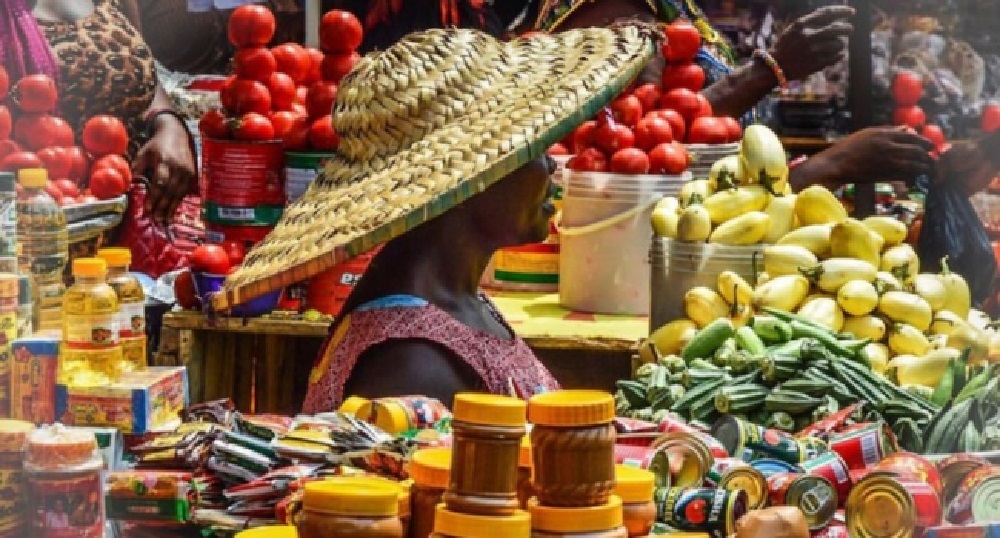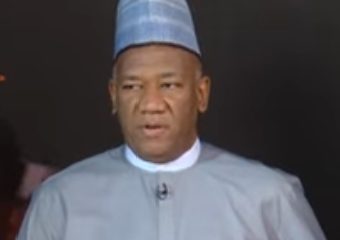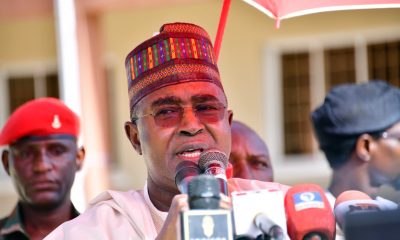Economy
FX platform: CBN sets $100,000 minimum trade for banks

The Central Bank of Nigeria has issued fresh guidelines for interbank foreign exchange trading via the Electronic Foreign Exchange Matching System, mandating a minimum trade value of $100,000.
The directive, dated 25 November 2024 and signed by Dr Omolara Duke, CBN’s Director of the Financial Markets Department, is part of efforts to ensure transparency, efficiency, and compliance within Nigeria’s FX market.
According to a new set of guidelines released by the CBN on Tuesday, the EFEMS is designed to streamline interbank FX trading, reduce counterparty risks, and ensure adherence to CBN regulations.
The apex bank has designated Bloomberg’s BMatch as the official order-matching platform for interbank transactions, with trading hours set between 9:00 am and 4:00 pm West Africa Time on business days.
One notable provision in the guidelines is the enforcement of a $100,000 minimum tradable amount, with incremental clip sizes of $50,000.
The EFEMS is also limited to spot FX transactions involving the Nigerian naira and the United States dollar.
The CBN, however, retains the discretion to introduce other currency pairs when deemed necessary.
The guidelines document read, “All trades consummated on EFEMS are binding unless canceled by mutual agreement of both parties with written approval from the CBN.
“The minimum tradable amount is US$100,000.00, with incremental clip sizes of US$50,000.00.
“Participants must set credit and settlement limits for other counterparties in the system. Transactions exceeding these limits will not be executed.
“Participants must have adequate credit and settlement limits set for the CBN as its counterparty bank.
“Participants are required to comply with the Nigerian Foreign Exchange Code and other CBN regulations.”
Participation in the EFEMS is limited to authorised dealer banks licensed by the CBN, while other institutions wishing to join the platform must first obtain prior approval.
Participants are also required to execute agreements with the CBN-approved platform provider, maintain accurate profiles, and operate within prescribed credit and settlement limits.
Withdrawal from the platform must be preceded by a 30-day notice, along with the resolution of any outstanding obligations.
Also, trades conducted via the platform will remain anonymous until matched. Counterparty details will only be revealed once transactions are concluded, in line with settlement protocols.
Transactions exceeding set limits or conducted outside EFEMS parameters must be reported promptly and logged onto the FX blotter within 10 minutes.
The CBN emphasised that it will closely monitor all transactions on EFEMS to ensure market integrity and transparency.
Participants are required to submit daily reports detailing trade volumes, settlement statuses, and counterparties.
The central bank also reserves the right to publish aggregated or disaggregated trade data for market analysis, subject to confidentiality agreements.
Any violations of the EFEMS guidelines or related regulations will attract strict penalties, including the suspension or revocation of access rights.
The CBN further stated that it will periodically review the platform’s operations to ensure efficiency and compliance with its directives.
In a separate document on Tuesday, the CBN announced that the Bloomberg BMatch system will officially go live as the EFEMS for foreign exchange trading on December 2, 2024.
The CBN outlined that all authorised dealers and banks in the interbank FX market are required to deploy the Bloomberg BMatch system for their trading activities.
The system aims to ensure uniformity and seamless trading among market participants while enabling the CBN to effectively monitor market performance and data management.
The central bank urged banks to liaise with Bloomberg representatives to expedite the onboarding process and address any technical or operational issues promptly.
Economy
Volvo announces termination of 800 U.S. workers, cites tariff, market decline

Volvo Group has announced plans to lay off up to 800 workers at three of its U.S. facilities over the next three months, citing ongoing market uncertainty and declining demand exacerbated by tariffs introduced under the administration of President Donald Trump.
The affected locations include the Mack Trucks plant in Macungie, Pennsylvania, as well as Volvo Group sites in Dublin, Virginia, and Hagerstown, Maryland.
In a statement on Friday, Volvo Group North America confirmed that between 550 and 800 employees would be impacted.
The company, a subsidiary of Sweden’s AB Volvo, employs nearly 20,000 people across North America.
The layoffs come amid wider turmoil in the automotive and manufacturing sectors, as shifting U.S. trade policy and a series of tariffs continue to drive up production costs. Economists have pointed to the uncertainty surrounding Trump’s trade strategy as a factor undermining both business and consumer confidence, with concerns mounting over a potential economic slowdown or recession.
According to Volvo, the company is grappling with a decline in heavy-duty truck orders, driven by instability in freight rates, anticipated regulatory changes, and the growing financial burden of tariffs. “We regret having to take this action, but we need to align production with reduced demand for our vehicles,” a company spokesperson stated in an email quoted by Reuters.
Volvo’s announcement marks another blow to an industry already navigating a complex web of supply chain challenges and fluctuating market conditions, with other manufacturers also warning of potential cost hikes and disruptions tied to global trade disputes.
Economy
Inflation surged to 24.23% due to escalating cost of living

Inflationary pressure has reappeared as Nigerians grapple with increases in average costs of basic food items and energy.
For the first time after the rebasing of the Consumer Price Index (CPI), headline inflation spiked in March to 24.23 per cent – 105 basis points above the 23.18 per cent recorded in the previous month.
The National Bureau of Statistics (NBS) yesterday indicated that the rate of increase in the average price level was higher in March than the level in February.
In January, the NBS updated the weight and price reference periods in calculation of the CPI to make the inflationary gauge more reflective of changes in consumption patterns and the economy generally.
The rebasing did not only brought the base year closer to the current period from 2009 to 2024, it also introduced some critical methodology changes to improve the computation processes.
After the rebasing, inflation dropped from 34.80 per cent in the pre-rebased period of December 2024 to 24.48 per cent in January 2025. It dropped further to 23.18 per cent in February.
In its latest report, NBS recorded 186 basis points changes between the monthly inflation rate, with the month-on-month rate rising from 2.04 per cent in February to 3.90 per cent in March.
The NBS attributed the spike to the rise in costs of food and alcoholic beverages, fuels and electricity, among other items.
Analysts at CardinalStone said the resurgence was due to renewed foreign exchange (forex) pressures amid heightened global risk-off sentiment.
They pointed at foreign portfolio investments (FPIs) outflows and increased dollar demand, which saw naira dropping by 2.4 per cent in March.
Experts also cited increase in price of Premium Motor Spirit (PMS) or petrol, following the temporary suspension of the naira-for-crude swap arrangement.
Food inflation rate stood at 21.79 per cent in March 2025. The composite food index decreased to 21.79 per cent from 23.51 per cent.
Core inflation, which excludes volatile agricultural produce prices and energy, rose to 24.43 per cent from 23.01 per cent.
Specifically, the month-on-month food inflation rose by 50 basis points from 1.67 per cent in February to 2.18 per cent in March.
The NBS attributed the increase in food inflation to increases in the average prices of basic food items including ginger, garri, broken rice, honey, crabs, potatoes, plantain flour, periwinkle and pepper amongst others.
On a state-by-state basis, food inflation was higher in Oyo with 34.41 per cent; Kaduna (31.14 per cent) and Kebbi (30.85 per cent).
On the other side, the 9.61 per cent recorded by Bayelsa; Adamawa (12.41 per cent) and Akwa Ibom (12.60 per cent), were the lowest inflation rates.
Analysts expressed concerns that the resurgent inflationary pressure might lead to renewed tightening stance by the Central Bank of Nigeria (CBN).
CBN Governor Dr. Olayemi Cardoso, had at the end of the first Monetary Policy Committee (MPC) meeting in 2025, reiterated the apex bank’s commitment to orthodox monetary policies, noting that the apex bank’s stance will be reflective of the inflationary trend.
With inflation rate dropping in February, the MPC had decided to maintain all key monetary policy parameters, including the Monetary Policy Rate (MPR) at 27.50 per cent, the asymmetric corridor around the MPR at +500/-100 basis points, the Cash Reserve Ratio (CRR) at 50.00 per cent for Deposit Money Banks and 16.00 per cent for Merchant Banks, and the Liquidity Ratio at 30.00 per cent.
Clarifying the impact of the rebased CPI, Cardoso had explained that the lower inflation figure should not be misinterpreted.
He underlined the need to analyse more data before drawing comparisons, noting that the CBN is currently assessing the figures and will provide further guidance in due course.
The CBN boss stressed the critical importance of collaboration between monetary and fiscal authorities in sustaining recent economic improvements.
Addressing concerns about the impact of elevated borrowing costs on economic growth, the CBN governor assured that the apex bank’s primary objective is to stabilize the foreign exchange and financial markets.
He expressed confidence that such stability would attract increased foreign investments, stimulating the much-needed economic growth.
Cardoso also highlighted the competitiveness of the Nigerian currency, which has spurred growing interest from international investors.
Economy
SEE Current Black Market Dollar (USD) To Naira (NGN) Exchange Rate

The exchange rate between the US dollar and the Nigerian naira continues to draw significant attention from individuals and businesses alike, especially those involved in international trade and remittances.
On Saturday, April 12, 2025, activity in the Lagos parallel market, commonly known as the black market shows that the buying rate for one US dollar stands at ₦1570, while the selling rate is ₦1575.
These figures are sourced from traders and Bureau De Change (BDC) operators who are active in key currency exchange hubs across Lagos.
Why the Black Market Rate Matters
Although the Central Bank of Nigeria (CBN) does not officially recognize or support the use of the black market for foreign exchange transactions, many Nigerians still rely on it due to difficulties in accessing forex through official banking channels. Issues such as limited availability, long processing times, and strict documentation requirements have made the black market a more accessible, albeit riskier, alternative.
CBN’s Official Position
The CBN continues to warn against participating in parallel market trading, stating that such activities undermine the stability of the national currency. The apex bank urges those in need of foreign currency to apply through authorized financial institutions, which are mandated to follow official exchange rates.
Nonetheless, the disparity between the official and unofficial markets persists, often influenced by market forces such as demand, inflation, and fluctuations in Nigeria’s foreign reserves.
Latest Exchange Rates Overview
Black Market (Parallel Market) Rate
Currency Pair Buying Rate Selling Rate
USD/NGN ₦1570 ₦1575
CBN Official Rate
Currency Pair Highest Rate Lowest Rate
USD/NGN ₦1630 ₦1570
Key Notes for Forex Users
The exchange rates in the black market often differ slightly from one location or dealer to another due to market volatility and negotiation margins.
Rates can also fluctuate within hours based on economic news, government policies, and global financial trends.
It is advisable to compare rates from multiple sources before conducting any large transactions, especially in volatile markets.
What This Means for Nigerians
The current forex rates reflect continued pressure on the naira, and many analysts believe that inflation, reduced oil revenue, and inconsistent monetary policies are key factors driving the demand for the dollar. For everyday Nigerians, this means the cost of imported goods remains high, and businesses dependent on international suppliers face growing challenges.
Until forex supply stabilizes through official channels, the black market will likely remain a major player in Nigeria’s currency landscape.
-

 News18 hours ago
News18 hours agoSAD! Popular Gospel singer, Big Bolaji is dead
-

 News9 hours ago
News9 hours agoBLACK EASTER: Over 150 massacred in Plateau, Benue
-

 News21 hours ago
News21 hours agoEASTER:Let’s use this period to pray for compassionate leaders -Obi
-

 News21 hours ago
News21 hours agoPresidency speaks on report that Shettima was denied access to presidential villa
-

 News20 hours ago
News20 hours agoSpeaker Abbas Salutes Christians at Easter, Urges All To Emulate Selflessness of Jesus
-

 News5 hours ago
News5 hours agoDouble tragedy: Father, three children, maid killed in Osun road crash
-

 News20 hours ago
News20 hours ago2027 : “If You’re Truly Smart, Don’t Bother To Contest -Datti tells Tinubu
-

 News21 hours ago
News21 hours agoRemain resolute in fight against drug scourge, Marwa charges NDLEA officers(Photos)


















